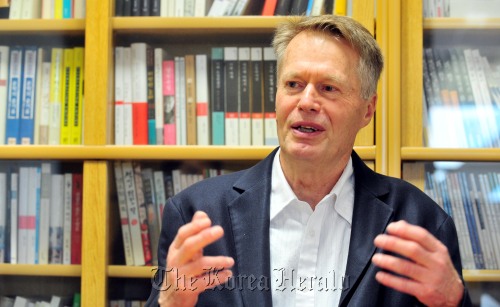Nobel laureate Le Clezio tells of his affection for ‘unique’ KoreaFor the Nobel laureate Jean-Marie Gustave Le Clezio, traveling is an essential part of his job, which provides insights and inspiration for his work. He picks South Korea as one of his favorite places.
“Korea still remains a question mark to me,” he says sitting in an office in Gwanghwamun, central Seoul.
Le Clezio, 71, who won the Nobel literature prize in 2008, is on a visit to Korea to attend the 3rd Seoul International Forum for Literature. He attended the second forum in 2005, and taught literature from 2007-2008 at Ewha Womans University.

Jean-Marie Gustave Le Clezio (Kim Myung-sub/The Korea Herald)
The white-haired writer recalls that he was more than surprised when he first visited in 2001.
“I already knew Japan, and I had been to China several times. I also lived in Thailand for one year, but Korea seemed a totally different country.
“There is the efficiency of Japan, seriousness of China and the love and fun of Thai people,” he explains with his calm demeanor.
When the Noble laureate visits Korea, he likes to try “naengmyeon,” a chilled noodle dish, and “samgetang,” a broth of chicken and ginseng. And apart from discovering the local cuisine, there is one more thing he likes to do.
“I travel a lot by metro when I’m in Seoul. I find this capital very unique,” he smiles.
He says he is often bemused by the difference between the young and old generations in the city.
“It strikes me that the young people are very active and seem to be very happy but old people remain from another time.”
The French writer senses that there is still injustice in Korean society.
“Some people, old people especially, are completely forgotten here. Korean culture is confusion, they should take better care of the old,” he says.
Still Le Clezio says he finds fun and joy here, admitting that he now has a deep affection for the country.
But he claims that Korea is still not well-known in the West.
“Now I’m living in the United States. For some reason, the only thing you hear about the country is the war and North Korea.”
The Nobel laureate says the role of Korean literature is crucial in changing misconceptions about Korea.
“I understand Korea better when I read Korean novels rather than articles or historical reports. It’s easier but brings more imagination,” he says.
Le Clezio’s fondness for Korean literature is no secret.
“I think Korean literature is very powerful. I especially like Korean short stories,” he says, noting some of his favorite writers, such as Hwang Suk-yeong and Yi Chong-jun.
But he says the translation of Korean literature is inefficient.
“When Korean books appear in the U.S. market it’s already too old because the translation dates back four or five years. Something has to be changed,” he said.
The 2008 Nobel laureate, however, still believes that the next the Nobel literature prize will come to this country.
“When I meet the jury of the Nobel Prize they ask me questions about Korean writers,” he says.
“I once wrote a letter to the jury for recommending a Korean writer. It didn’t come out that way, last time. But this will come next time, if I keep writing the recommendation letter,” he chuckles.
By Oh Kyu-wook (
596story@heraldcorp.com)






![[KH Explains] How should Korea adjust its trade defenses against Chinese EVs?](http://res.heraldm.com/phpwas/restmb_idxmake.php?idx=645&simg=/content/image/2024/04/15/20240415050562_0.jpg&u=20240415144419)